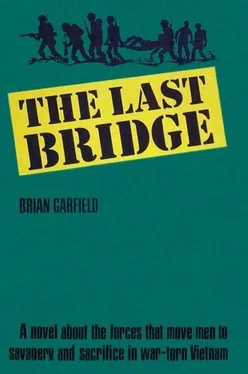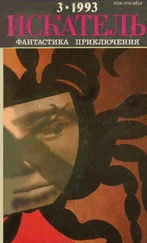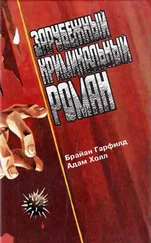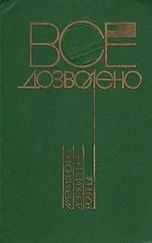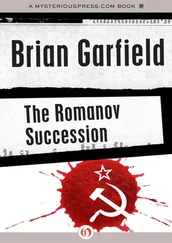Afterward he rolled away from the smell of it, but the smell came with him. He turned to his left and moved slowly through the trees. The gun was heavy, and the air chilled his sweating face. His mouth tasted terrible: dry, sticky, foul, morbid.
He swung behind a tree and searched the dark. Impatience boosted him away. He walked around, putting an unlit cigarette between his teeth. His feet followed each other into the night. He had lost his bearings, but it did not seem to matter. His face was streaked with sweat and dirt.
A small movement halted him. A man — or a branch stirred by wind? His damp clothes clung flat to his back. He shifted his weight. That small sound made the shadowed mass move in his vision, and he saw the fragmentary race of light along the length of a gun barrel. Curious, cautious, the other stepped forward into better light, and McKuen shot him down.
He dropped prone and wriggled to the base of a thick tree, half submerged in mud. Three rifles and an automatic weapon were talking, all of them aimed at the spot where he had stood a moment before. That’s all of them , he thought calmly. Four men. He fired a long burst at one of the flashing rifles and the rifle went silent; McKuen rolled away from the tree and ran humpbacked through the jungle while the three remaining guns, none of them very far away, increased their fire angrily. He tripped, and felt a soft object under him. One of the men he had killed. The man carried a pair of grenades.
McKuen tossed one of them at the chattering automatic weapon. He thought, I’ve got a Goddamn charmed life. Nothing can touch me. The grenade did not go off. He pulled the pin of the second grenade and threw it after the first.
The explosion lit up the jungle. Something stung his ribs along the right side of his body. The automatic weapon went silent and so did one of the rifles nearby. McKuen thought, I’m hit. He saw the one remaining rifle chugging red blossoms off at an angle, not shooting toward him at all. McKuen chopped down with the submachine gun and braced it against his arm and held the trigger back, sweeping the district until all the guns but his own were dead.
He wheezed like an engine and sat down crosslegged in the forest. His side was bleeding, cut open along a ragged scratch. Not a bullet , he thought. Not a bullet. Shrapnel from that Goddamn grenade I threw. Hoist by me own bloody petard.
He made a bandage and lay back chewing on the unlit cigarette. That was when his hand began to shake. The tremor came slowly and grew worse. Presently his body shook. He had to lie flat. His lips jerked into a grin. “I am a bloody hero. Who’d ever believe that? A bloody war hero.”
He stood up. “A bloody dead hero’s what I am,” he muttered. The jungle was impenetrable. It was four o’clock in the morning, and there was no light. He did not know how far he had come away from the Sang Chu gorge. He did not know which way to go. But he turned around on his heels, a full circle, and he said, “That way,” and he walked into the jungle, dragging the submachine gun by its barrel.
Chapter Forty-one
0400 Hours
“Take ten,” Tyreen said. He put his back to a rock and slid down to sit on the damp earth. Forty yards below him the jungle began again, unrolling across the valley. He could see the mountains a dozen miles away, the upper end of the high gorge breaking starkly out of the forest.
Saville and Hooker laid down the stretcher and Eddie Kreizler rolled his head toward Tyreen. “Magiccarpet treatment,” Kreizler said. His tone bespoke his belligerent fight against the effects of pain.
Nguyen Khang climbed higher on the mountain to search the valley. Tyreen sat back and let his chugging lungs settle down. He swallowed a capsule and felt the small number of them left in the tin in his pocket; he allowed himself a dreary moment’s anticipation of the hours ahead. Kreizler said, “I’m hungry as hell,” and Saville found a ration for him. J. D. Hooker’s cropped head tipped forward against his chest; his flat face was dull. Across the valley the rough hat and spear contours of the heights stood against a mottled, half-broken sky, graying up in false dawn. Flows of mist filled pockets on the hills, and when Sergeant Khang came sliding down from his reconnaissance he said, “Going to warm up today, I think. Can’t see much down there.”
Faint abrasive sounds came out of the jungle. A few birds whistled. Khang went down to the edge of the trees and disappeared in darkness. Tyreen leaned his head back and closed his eyes momentarily. The sky threw a steady growth of illumination across the landscape. Tyreen’s eyes slid open, and he found J. D. Hooker studying him. Hooker possessed an unbreakable solemnity; Tyreen could never remember seeing him laugh. Hooker’s face was the cold color of marble. He said in a half-cranky tone, “It’s getting late to be hanging around here. Sir.”
When Tyreen said nothing, Hooker’s chin thrust forward. Always ready to pick a fight, Tyreen thought. Theodore Saville said, “You ought to pick your enemies with more care, Hooker.”
“What?”
“Can’t hate everybody, can you?”
“What’s that supposed to mean?”
“Forget it,” said Saville. Hooker looked away incuriously. Darkness gave ground quickly, and on the eastern horizon a pale yellow band appeared and spread out, quite rapidly, along the hilltops.
Tyreen saw Hooker’s gun muzzle move. His eyes caught a movement that disappeared in the trees and presently came in sight again. Tyreen moved his body to one side to have better control of his submachine gun. After a moment he relaxed. “All right. It’s Khang.”
Sergeant Khang paused at that moment, on the edge of the trees, and studied the shadowed rocks with care. Tyreen’s voice crawled softly down to him: “Come on up.”
Khang slid into the rock’s overhanging shadow with the smell of his exerted sweat pumping out. When his breathing had softened, he said, “Nobody around. There’s a trail, but I think it may be mined.”
Violet shadows crept backward across jungle depressions, in fast-moving retreat. Tyreen shaded his eyes with the flat of his hand. The red rim of the ascending sun came over the horizon and flared against his face. He put his head back against the hard, grainy rock; his legs flopped out straight, and he lay as though collapsed. A loose tangle of memories crowded paths through his tired mind, of times and places that had nothing in common with this time and this place. He heard Kreizler murmuring to Saville about his wife back home, and he heard Saville’s grunts of reply. He thought of the few women he had known, and wondered why he had been unable to stay with any of them, or they with him. Odd thoughts, stray images — he had for one instant a clear vision of Saville on a swaying boat deck off the Korean coast, firing a semiautomatic rifle with deadly, methodical precision into the trees above a thin band of beach.
He opened his eyes, and the red disk of the sun was balanced on the horizon. The slanted rays turned the far mountain of the Sang Chu gorge crimson and violet. They splashed the faces of his companions with a ruddy flush, all except Kreizler’s, which lay in shadow and remained pale and strained.
Saville moved his weight up to the rock. “David, you been giving any thought to what we do when we get there?”
“We blow up the bridge.”
“While two hundred People’s Soldiers twiddle their thumbs and cheer us on?”
Tyreen drew a picture on the ground. “This is the gorge. The bridge crosses it here. On the south side there’s a big shelf, maybe a hundred yards deep and a quarter mile long. That’s where the troop barracks are. Fortifications and the rest. On the north side there’s a small guard tower. It’s all they’ve got room for. The tracks make a small turn and go into a tunnel maybe fifteen yards from the bridge. The tunnel comes out on the north side of the mountain. It’s about a third of a mile long.”
Читать дальше
